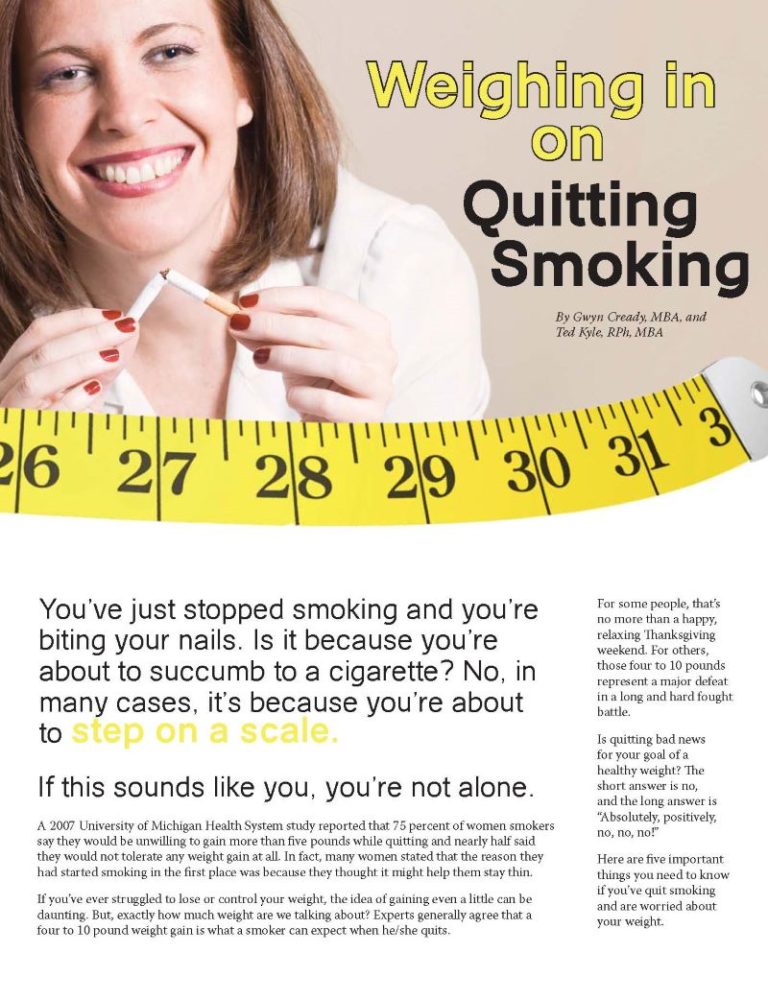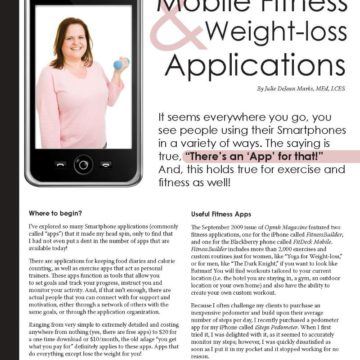Weighing in on Quitting Smoking


by Gwyn Cready, MBA and Ted Kyle, RPh, MBA
Summer 2010
You’ve just stopped smoking and you’re biting your nails. Is it because you’re about to succumb to a cigarette? No, in many cases, it’s because you’re about to step on a scale. If this sounds like you, you’re not alone.
A 2007 University of Michigan Health System study reported that 75 percent of women smokers say they would be unwilling to gain more than five pounds while quitting and nearly half said they would not tolerate any weight gain at all. In fact, many women stated that the reason they had started smoking in the first place was because they thought it might help them stay thin.
If you’ve ever struggled to lose or control your weight, the idea of gaining even a little can be daunting. But, exactly how much weight are we talking about? Experts generally agree that a four to 10 pound weight gain is what a smoker can expect when he/she quits.
For some people, that’s no more than a happy, relaxing Thanksgiving weekend. For others, those four to 10 pounds represent a major defeat in a long and hard fought battle.
Is quitting bad news for your goal of a healthy weight? The short answer is no, and the long answer is “Absolutely, positively, no, no, no!”
Here are five important things you need to know if you’ve quit smoking and are worried about your weight.
1. Don’t Think Twice
You’ve made the right decision. Smoking offers far greater risk than the risks associated with gaining a few extra pounds. Smoking is the number one preventable cause of death in the United States. More than 400,000 people die from it each year. In addition, smokers are anywhere from 12 times more likely (women) to 22 times more likely (men) to get lung cancer and they’re twice as likely to have a heart attack.
One estimate suggests you would have to gain 100 to 150 pounds to make your health risks as high as when you smoked. The U.S. Surgeon General has said, “Smoking cessation represents the single most important step that smokers can take to enhance the length and quality of their lives.” So, congratulate yourself and don’t look back!
2. Being Active Makes a Difference
Swim, play tennis, walk the dog, rearrange the garage or make your next phone call a walking one. Whatever your current activity level, turn it up a notch or two. Studies show that not only is being active a good way to control your weight, it’s also a great way to distract yourself from cravings while you quit. One study showed that people who exercised while quitting were twice as likely to be successful.
Some people worry that tackling two efforts at once (quitting smoking and getting more active) is too much to try at once. Don’t think of it as two efforts. Think of it as one effort: quitting smoking. And think of staying active as a helpful way to keep yourself smoke-free.
3. Change Your Routine
When you’re trying to quit, the old familiar places are not your friends, especially if those old familiar places involve eating or drinking or any other signals that make you think about smoking. Cravings for cigarettes can be triggered simply by being in a place that was once a regular smoking place for you, such as a bar, the sidewalk outside the lunch room at work, your car, etc. Stay away from bars (and save the alcohol calories) and take a walk instead of lighting up after you eat.
Other routine-changers that can help include dumping out that bowl of candy and replacing it with packs of sugar-free gum and keeping crunchy snacks like carrots and celery in sight. Try new fruits and vegetables, too. Remember, your senses of smell and taste have improved, and nothing is better than the burst of flavor from a mango or some kohlrabi.
4. There’s No “I” in Team
Be open with your friends and family about your quitting and your concerns about gaining weight. Your friends and family will be happy to know you’re doing something so good for yourself. They may even have some good suggestions about how to overcome the hurdles you face. Ask for their help as you work toward your goals.
Another good reason to be open is because one person’s quit attempt or diet often triggers the same action in others. Your struggle becomes a beacon for someone else. And you never know, you may find a partner with whom you can share quitting stories or to accompany you to the gym or on a daily walk.
You could also consider joining an online quitting support group like Quitnet (quitnet.com) or the Smoking Cessation Forum at About.com (quitsmoking.about.com) to discuss different approaches to controlling weight when quitting. Let the support of others help buoy you along.
5. Double Your Chances
Why do so many smokers go through their quit attempt without the help of treatments that are proven to double one’s chances of success? It might be because some don’t understand how stop-smoking drugs work.
Years of smoking increase the receptors in the brain that respond to nicotine. Take that nicotine away, like you do when you quit, and those receptors call out for it, something you feel as a craving. Step-down, over-the-counter nicotine replacement products like Nicorette gum, NicoDerm patch and Commit lozenge provide lower and lower doses of nicotine throughout the course of several weeks to slowly wean your receptors off nicotine. That way you can focus your willpower on trying to do the rest. And, Nicorette has been shown to help reduce weight gain while quitting. Prescription product Chantix works by blocking the receptors that bind to nicotine and has also been shown to double your chances of success.
Follow these suggestions and it may not be easy, but you’ll have certainly given yourself a better outlook on quitting. But, what if it’s been more than a year since you quit and that “freshman quitter 10” seems to have become a permanent part of you? Don’t fret, the same approach that can work when you’re quitting can work even if you’re a year out.
First, give yourself a major pat on the back for overcoming a real challenge. Quitting smoking is hard, and you’ve done it. You breathe easier, your sense of smell has improved, your chance of heart attack has decreased, your excess risk of heart disease has dropped to half that of a smoker’s. You’re a whole new person (even though you happen to be a whole new person with a few extra pounds on him).
Next, get active. Whatever you’re doing, do more. A brisk walk around your neighborhood will be a lot easier now than it was when you were a smoker.
Also, eat less and eat healthier. Replace your calorie-laden snacks with fruits and vegetables. Ask for support from your friends and family and look to online support groups to give you their real-world suggestions for losing the weight.
But most of all, remember you’re the same person who tackled one of the hardest habits to break and succeeded. How are a few measly pounds going to intimidate you? Go get ‘em, tiger!
About the Authors:
Gwyn Cready, MBA, is a communications consultant with more than 20 years of healthcare policy and brand marketing expertise as well as an award-winning romance novelist. You can visit her at www.cready.com.
Ted Kyle, RPh, MBA, is a pharmacist and health marketing expert and also a member of the OAC National Board of Directors. Ted has worked for more than 10 years on programs and products to help people quit smoking and lose weight.
by Kendall Griffey, OAC Communications Manager Spring 2024 We have officially kicked off Your Weight Matters Regional…
Read ArticleTelemedicine became a popular tool during the pandemic because it allows healthcare professionals to provide medical care…
View Videoby Kendall Griffey, OAC Staff; and Chrystal Jones, OAC Staff Fall 2022 For over ten years, the…
Read Article










